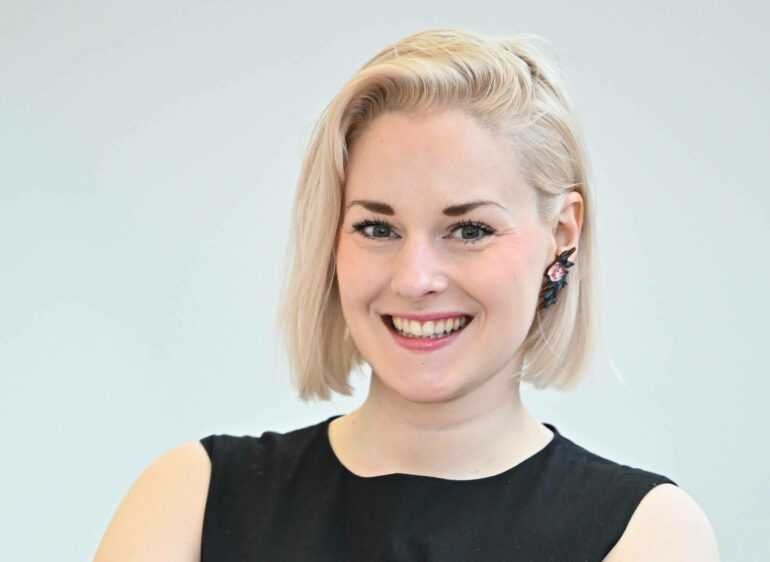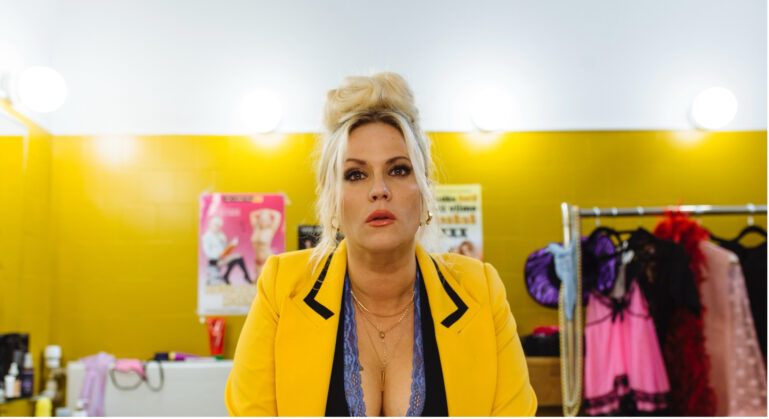WRITTEN BY: Lina Nystrand
Jemina Jokisalo talks about how she challenged stereotypes about sex workers in her dramedy series Money Shot, and what it takes for a team to find the right balance between humour and deeper emotions.
Finnish writer Jemina Jokisalo is nominated for Nordic Series Script Award 2025 for the 8-episode drama series Money Shot (Toinen tuleminen).
The series tells the story of Sari, a former porn star, who teams up with an aspiring director to start producing feminist, erotic films in order to fulfil women's desires.
Money Shot premiered on Elisa Viihde 2 May 2024, and is written by Jemina Jokisalo, and directed by Teemu Niukkanen. The series is produced by Just Republic.
What motivated you to deal with the porn film business in the comedy genre?
The idea for the series came about in 2019. Together with executive producer Sasu Norhomaa we were throwing around ideas and feeling somewhat stuck. Sasu just basically joked to me that sex always sells, and we’ll have to start producing porn. I replied: ”OK, but it has to be feminist porn at least.” Quite soon I realised that this would actually make a really interesting series. I had been following the work of Erika Lust, a Swedish filmmaker who directs feminist erotica. The topic felt current, and nothing had really been done about it in the drama space yet.
I think sex can be absurd, and making adult entertainment definitely has its absurd moments. I wanted to create characters we really feel for, but also to make them colourful, vibrant, a little over the top. The show is really about the two women: Sari, a washed-up porn actress, and Linnea, an aspiring director who’s never accepted to film school. Their personal stories evolve around the making of feminist erotica, but most of all it’s all about them.
I think Money Shot is funny, but then it has these deeper moments where you really feel for the characters.
Can you describe your research and working process around creating and structuring the series?
I came up with the two main characters and the basic concept for the series quite fast. I fell in love with both Sari and Linnea, I wanted to tell their stories. Money Shot instantly felt like an opportunity to create something bold, different, sweet and daring.
I spoke with women who have done porn or sex work, and the number one thing everyone said was that they’re almost always portrayed in series and films as victims, and somehow damaged. And almost always the sex work somehow ruins the character’s life, forever. I wanted the show to be sex-positive and free of shame. Sari struggles with the fact that everyone thinks they know what kind of a person she is, just because of what she’s done for work. But Sari is able to overcome this and find her own way.
Finding the exactly right tone and story took some time. I went from dramedy to pure comedy, then towards a more drama approach, and ultimately back to dramedy. The number of episodes (8) and that each episode would be around 25 minutes, felt quite clear from the start. It just intuitively felt like the right fit, and was also preferred by the commissioner. This series was a bold commission, and I’m grateful Elisa Viihde decided to go for it. When we got the green light from Elisa, brilliant episode writer Daniela Hakulinen came on board. She wrote two episodes, and I wrote six.
How did you create your two female main characters?
I wanted Sari to be a fighter. A flashy character, but with a warm heart. When she’s told she’s not young enough to be in front of the camera anymore, it forces her to find a new way to make a living. She evolves from someone who’s been the object of everyone’s gaze to taking matters into her own hands. I thought a lot about real life people as references to her, and actually Dolly Parton was one of my inspirations. I love how she owns her appearance and style, keeps doing her own thing, unashamed and not paying attention to what some people might think.
Linnea, on the other hand, comes from an artistic family that has a lot of money, but she’s an outsider because she can never get into film school, despite her dad being a famous director. She’s also stuck in a relationship diluted to friendship, and has never had an orgasm. Linnea figures out that: “OK, if I start making these films for women, maybe I can find some enjoyment in my own life.” And it ends up turning her life around.
Linnea is maybe closer to my own character, or what I was like when I was younger. I don’t come from an artistic family, quite the contrary, but when studying in film school I felt there was a lot of hierarchy, a lot of judging people by their background, or by how talented someone was considered to be. I believe that talent is nice, but hard work goes a longer way. I dislike phony poshness, or judging people by what they’ve achieved. Linnea becomes a rebel in her own family.
In the end, everyone has to find their own way, and it’s never too late to reinvent yourself.
What was the biggest learnings/surprises from writing the series?
I learned so much! Maybe the biggest lesson for me was that when it comes to comedy, go big or go home. There’s no point in doing anything lukewarm. Some people might be upset, but at least no one is bored, hah.
Also, the readthroughs with the actors were really useful. They look at their character from their specific perspectives, and can offer a lot of insight to the writer. After all, the writer has so much to think about at the same time: all the characters, the overall story, turning points and punchlines, just to mention a few. A more specific approach can offer a much-needed observation, like making a small change in how someone behaves, and suddenly it makes a scene or a whole storyline a lot better.
Director Teemu Niukkanen and you are both known as comedy creators – how did you collaborate to make people both laugh and get new insights?
Teemu fell in love with the script from the start. I noticed early on that we found the same things funny, which was important. If the two of us would have a completely different sense of humour, it wouldn’t make sense working on a comedy series together.
We discussed the story, characters and scripts a lot. Teemu was also very candid with me. For example, one scene felt too cute for him, and he told me he doesn’t know how to make it funny. So I changed it. I think this kind of dialogue is super important. After all, it’s the director who has to go on set and make it work.
Even though Teemu only directs comedy, he knows that everything funny comes from something true, and sometimes even tragic. He wasn’t afraid of letting the emotional moments of the story shine and have the space they needed.
Did you participate in the casting and final edit?
Yes, I was involved in the casting, and the editing process. With Teemu we shortlisted the actors we wanted to test shoot, and I let him handle the casting sessions. Afterwards, I watched all the casting tapes with fresh eyes. It’s funny how sometimes an actor can really shine through in the tape, and I actually consider that the most important aspect. We are in the business of making TV series, after all, so what comes across through the camera is what matters. I had a lot of say in selecting the actors, and luckily, we were very much on the same page with the director.
We needed a big name for Sari’s part, and Pihla Viitala is definitely one of the biggest names. We were lucky to have her in the show. Very skilfully she portrayed a funny, fierce, and layered Sari. I also loved her enthusiasm: She came to the first meeting and was like: “OK, I was looking at this documentary about old porn actresses, and I need the nails, and I need to dye the hair.” And Reetta Ylä-Rautio, who plays Linnea, just blew us away during the casting process. She has impeccable comedic rhythm.
The editing process was quite a smooth one, a collaboration between the editor, Jesse Jokela, the director, the executive producer, and me. I watched all the episodes in several stages of editing and gave my insights. I do believe the creator is kind of the heart of a series, and being involved in the editing process can be very valuable.
Looking back, why did you become a scriptwriter? Have your storytelling dreams come true?
Ever since I learned to read and write, I’ve been a storyteller. When applying to study, I just searched for places where one could write stories to make a living. One programme was for screenwriting, and I applied, not really knowing what a screenwriter was. During the five-day entrance exams, I did find out though, and suddenly I just knew I could do this. In this profession you can always learn more, always get better, always broaden your perspective, and I love that. During the past three years I’ve learned a lot more about producing.
I still have plenty of storytelling dreams to achieve. I guess a new idea is also always a new dream: We get an idea and work hard to be able to see it as a series one day. But I have to say that Money Shot is one dream that has come true. It’s a series with a very distinctive world and tone, and I’m very lucky I got to create something like that. Being a writer has its highs and lows, but the feedback and recognition that the series has received has felt really special. I will cherish those in my heart to light up the days when a new idea is just a tentative thought, and years of work lie ahead. That’s where everything always begins.
Official trailer:

